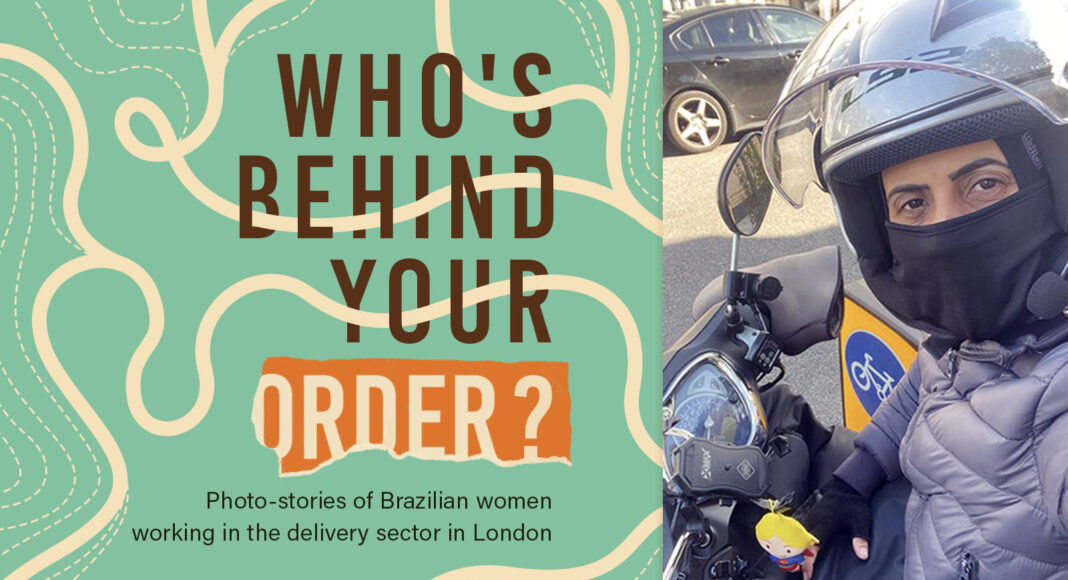When the door opens,
that’s when you shut down to me
you ignore my presence,
your package is important.
It doesn’t matter if, with vulnerable
body, I hold in my hands the weight
of being a woman.
This territory is not mine,
I’m not from here, I’m from nowhere.
The position you destined for me to
humiliate and despise me and thus,
with cowardice, convince me that
I will never end up breaking
my chains.’
AKA SI
Who’s Behind Your Order? an arts project and exhibition developed by Migrants in Action (MinA) in collaboration with photographer and anthropologist, Paula Siqueira, and poet, Simone Souza, focuses on showing the overlapping types of exploitation faced by migrant women in the delivery sector. The exhibition showcases photographs taken by migrant delivery women together with reflections on their lives and their experiences of delivery work gathered via WhatsApp and Zoom calls and documented in voice recordings.
The exhibition examines intersections between gender, race, and immigration status and illustrates how delivery work contributes to financial autonomy – which is fundamental for ensuring women’s wellbeing and escape from gendered violence.
According to research led by Professor Cathy McIlwaine from King’s College London which the project is based on, 82 per cent of women in London’s Brazilian diaspora have experienced gender-based violence and 48 per cent experienced this violence while in the UK. For these women, 78 per cent of gender-based violence was committed within the public sphere, predominantly while at work. The findings are summarized in the report We Can’t Fight in the Dark.
Yet the photostories of this project, told by Brazilian women delivery drivers themselves, challenge mainstream narratives of the feminized victim; the participants’ voices are front and centre in this exhibition, which crafted from their experiences.
Using the photovoice approach, delivery drivers responded to weekly questions posed by Carolina via WhatsApp and shared digitally some of the images they had taken of their days. The result is an exhibition displaying a plethora of stories, experiences, emotions, moments of positivity as well as despair, and an immensely human look at delivery work, forcing viewers to interrogate their own relationship with the service industry.
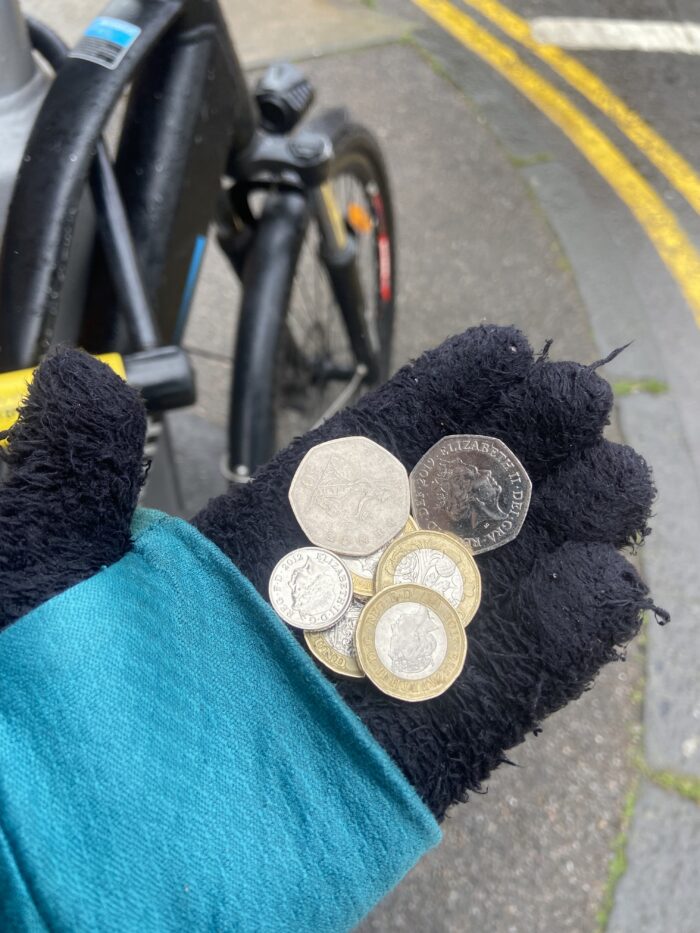
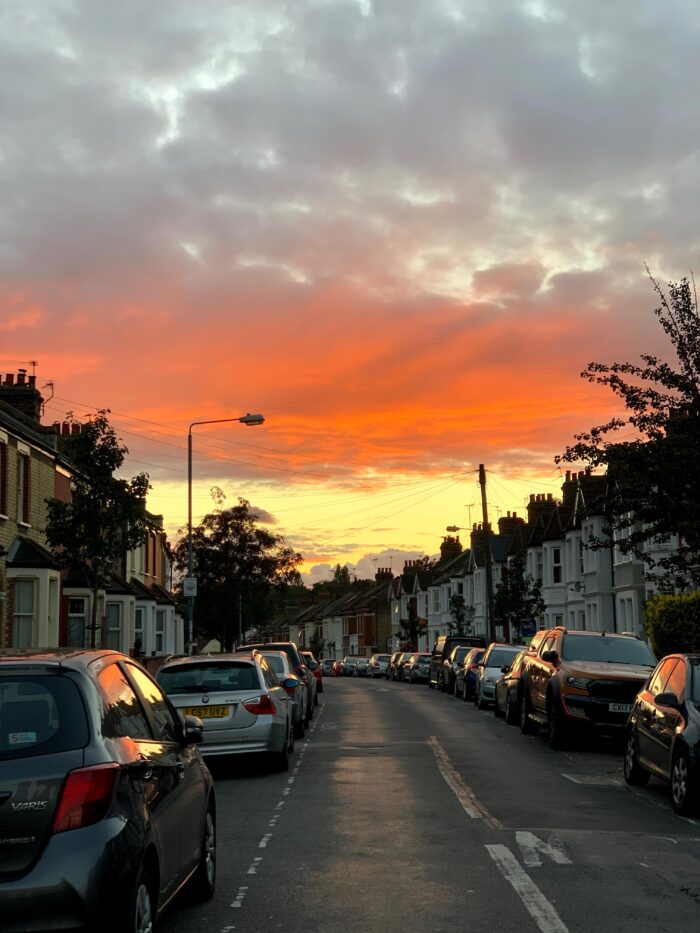
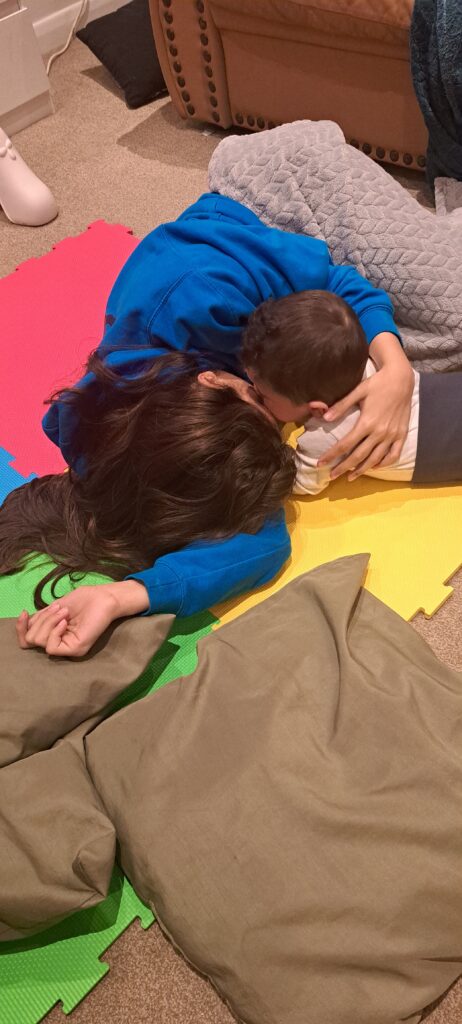
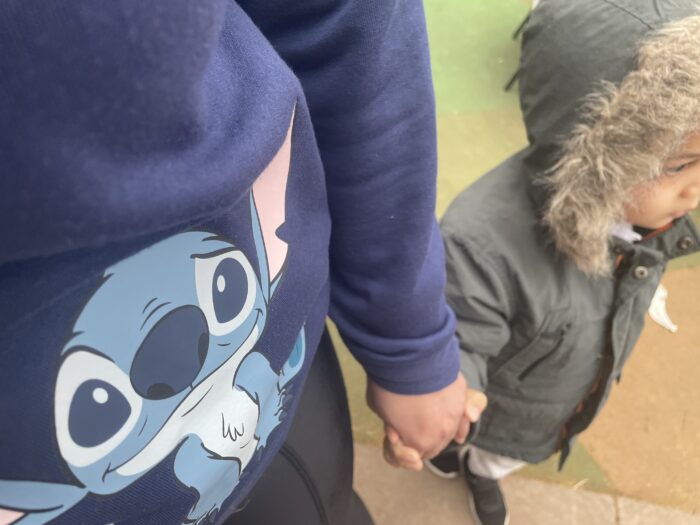
Read the full report, see all images, and hear women’s testimony here.
The women shared some key issues they face in the industry:
- Inclement weather can physically and mentally restrict delivery work. The participants recalled wet, freezing conditions restricting their mobility on bikes under heavy layers of clothing, and a sense of hopelessness embodied by the grey skies. Yet the women also shared images of sunsets and the natural beauty of London captured while on delivery jobs reflecting the pride the women felt after enduring long days in the cold.
- Accidents can seriously injure both the workers and their means of transport, and are not compensated for by employers. Psychologically, potentially life-threatening car or bicycle crashes can be terrifying and make getting back out on the road overwhelming.
- Violence and theft can have a pronounced effect on these workers who rely on limited equipment for work. Bicycle and motorbike theft is debilitating for delivery workers and again, reinforces a psychological struggle for them and deep-seated feelings of vulnerability.
Dark alleys and poor internet connections at night were identified as especially dangerous.
- Gender discrimination and harassment haunts London society and is marked within the male-dominated delivery sector. The exhibition explores many details of gender discrimination that are commonly overlooked. For example, the participants note the hardships of menstruating while cycling all day without easy access to bathrooms. The effects of gender-based harassment from other male delivery drivers also emerged as an issue for them. Yet for those with insecure immigration status, reporting to the police was not an option.
One woman shared her anxieties: ‘I asked myself if this would keep happening, and what kind of situations I needed to endure. It was a feeling of humiliation, disappointment and anguish.’
Preventing gender-based violence in the workplace is urgently required across London and beyond. MinA has been advocating for a society free from gender-based abuse and violence since 2018, using applied arts-based approaches and theatre to build a community for minoritized migrant women – specifically those from Brazil who are the largest Latin American nationality group living in London according to Towards Visibility (McIlwaine and Bunge, 2016). Drawing on this and We Can’t Fight in the Dark, there are five significant risk factors for Brazilian women’s susceptibility to gender-based violence in London:
- Lack of English language
- Lack of secure immigration status
- Isolation and loneliness
- Lack of information
- Exploitative working conditions
MinA was established and is run by Brazilian women. The team has campaigned tirelessly to mitigate the impacts of these conditions on migrant women, especially for those lacking secure immigration status, whose vulnerability is weaponized by many abusers seeking to manipulate and overpower migrant women. British institutions continue to demonstrate contempt for migrant women survivors of abuse as information given to police when reporting gendered violence can be shared with the Home Office and women can be deported accordingly. Building a community through theatre and art allows Latin American women to become vehicles of social transformation in their own London, and ultimately to find a home here – as MinA, People’s Palace Projects, and McIlwaine have explored elsewhere.
In reflecting on what comforts her, one delivery app driver stated: ‘My comforting thoughts are of my children, who are at home, waiting for my love and affection. And my sacrifice won’t be in vain, because it’s for them, so that they have the best I have to offer’.
Levels of gender-based violence remain high across London while organizations and institutions of support are increasingly underfunded, especially those for migrant women. Who’s Behind Your Order? raises awareness of the multiple impacts of gender discrimination on migrant women’s daily lives through art and creativity. This is one more step towards the societal transformation needed to tackle violence against women and girls in the workplace in the longer-term.
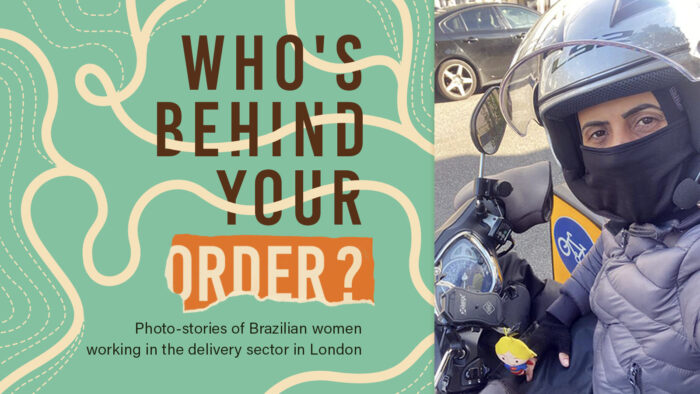
Who’s Behind Your Order? was shown at an exhibition staged at Brixton House in London in June 2023 and is summarized in this exhibition catalogue.
Seona Kehoe is an undergraduate student at the University of Manchester studying Modern History and Politics.
Who’s Behind Your Order? was funded by the EPSRC via King’s College London (EP/X527920/1) as part of a wider impact project ‘Tackling Gendered Violence Transnationally’ directed by Professor Cathy McIlwaine. For more information on this research see here.




